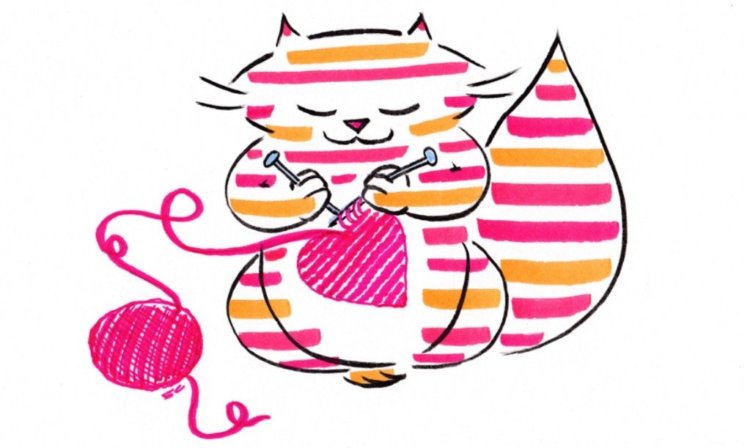
When we think of spiritual activities, what probably comes to mind are yoga, meditation (though that’s not really an activity, and that’s kind of the point), walking in the woods, looking up in wonder at a star-filled night sky, making food for the homeless, and those sorts of things. Now I can add something else to that list: knitting. To understand why my new favorite pastime/obsession is becoming a spiritual action, we have to unravel a misunderstanding about one of the primo concepts of Yoga: Karma.
In our culture, Karma is perceived as some sort of cosmic cop, the justice system of the universe: Do something bad, and something bad will happen to you. Karma is also thought of as a rewards system—do something good, and good things will happen to you. Life would be so incredibly simple if any of this were true, but if you think about it for five seconds, you realize it’s a metric ton of BS.
Bad things happen to good people all the time; in my book Yoga Mind, I tell the story of my friend Francesco, a person of such goodness people and animals loved him on contact. He dove into a pool one day, broke his neck, and became quadriplegic. Why, if the popular idea of Karma were true, would that happen to such a wonderful person? And, maddeningly enough, there are plenty of people we’d consider downright evil who don’t seem to be suffering all that much.
So if Karma isn’t a cosmic justice system, what the heck is it? In a basic sense, Karma is simply cause and effect; when there is an action, there will be a result. Toss a pebble into a pond and ripples happen. Tossing the pebble is the action; ripples, the result. No reward or punishment, just cause and effect.
The concept of Karma was introduced by ancient yogis to the general population in order to encourage them to think things through before jumping on impulsive, often selfish thoughts. Yeah, you might want to steal your neighbor’s awesome cow, but you also might want to think about it first, because that action could have many bad results. On average, bad actions do reap bad results, while good deeds are rewarded. Mostly. We hope.
But now you can see how the cause and effect formula got twisted into the Santa Claus idea—if I do something good, I’ll get all the gifts, and if I’m naughty, it won’t be nice. This thinking can prompt people to become hyper-focused on results, rather than doing things without thought of reward.
This is where knitting taught me a yoga lesson, stretching out some knotty thinking.
RELATED: Take a vacation from yourself
I’ve always been a bit of a control freak, probably because I grew up feeling very out of control of life—my mom working so hard to support us, my grandparents’ sudden passing, being bullied on a basis so regular it was almost boring, and the usual universal problems. When I became an adult, yoga was my attempt at becoming more easygoing, less controlling.
But I remained a very results-oriented girl. If I did something, I didn’t just want to know what was going to happen, I wanted to script it way ahead of time, making sure everything would turn out well in my own little Marvel universe.
You can imagine how many disappointing plot twists this led to. Life may have a plan, but it’s not mine. Over time, I’ve learned that the less I focus on results, the happier I become. And my favorite lesson in this came from knitting.
After reading about how knitting can relieve stress and anxiety, I started knitting regularly, and apparently well enough that friends and family wanted me to make things for them. They loved the items and told me how beautiful my knitted stuff was, and that made me really happy—and very focused on the results of my knitting.
But when I joined a knitting group at my local yarn shop Knitty City, they asked if I’d make a charity scarf. They do this sweet project called #foundbutnotlost where they make scarves and then leave them in parks for people who need them. You don’t know who’s going to get your scarf, or when, or where. You won’t know if the person is going to like it, or wear it while they’re out in the chilly weather for an hour and then ditch it. If you take the action, you have to let go of the result.
These giveaway scarves have become my favorite projects. I get no accolades from them, no hugs, no applause—the people at the knitting store just hand me another huge ball of yarn. The charity scarves have taught me a pure, smooth lesson about Karma: If I take this action that will benefit others, I will feel good now, independent of some external factor like someone saying thank you.
And when I take that action, there will be a result: Someone will be warmer, for a lifetime, or for an hour. Maybe a child, maybe an elder, maybe a couple who will snuggle together so they can share the scarf, maybe a homeless person sleeping alone on the street. I am knitting for a stranger, and I’m knitting with as much love as I would for a family member. All I have to do is perform the action that will be of benefit, and will not be of harm. Karma will take care of the results. And knowing this has made me one very happy little control-free freak.
Suzan Colón is the author of Yoga Mind: Journey Beyond the Physical, 30 Days to Enhance Your Practice and Revolutionize Your Life From the Inside Out.


Grok Nation Comment Policy
We welcome thoughtful, grokky comments—keep your negativity and spam to yourself. Please read our Comment Policy before commenting.